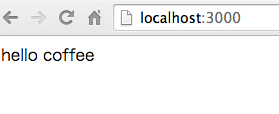モチベーション
なんとなく避けてきた感があったのですが笑
最近、周りでCoffeeScript使いが増えて来ていて、めちゃ進められるので今更ながらやってみます。
普段はNode.jsを書いているのでNode.jsをCoffeeScriptで記述していきます。
Node.js+CoffeeScriptといっても調べてるとやはりexpress3系の記事がまだ多いですね。
準備
- 公式サイトはこちら http://coffeescript.org/
インストール
- 普段Node.jsを使っている人なら以下のコマンドでインストール出来ます。
$ npm i -g coffee-script
今回の環境
- Node.js: v0.10.35 (←アップデートしてみた)
- CoffeeScript: v1.8.0
- express: v4.10.6
実装
とりあえずexpressをインストールしておきます。
$ npm i express
- メインのapp.coffeeを記述
app.coffee
app = require('express')()
http = require('http').Server(app)
port = 3000
app.get '/', (req, res) ->
res.sendfile 'coffeeTest.html'
http.listen port, ->
console.log "listening on *:", port
- 表示するhtmlファイルを作る。
$ echo 'hello coffee' > coffeeTest.html
実行
$ coffee app.coffee
listening on *: 3000
express deprecated res.sendfile: Use res.sendFile instead app.coffee:11:16
- http//localhost:3000 にアクセスして確認
まとめ
かなりカンタンに書けますね。
毎回コンパイルする必要があるかと思っていたのですが、coffeeコマンドで直接Node.jsを実行出来たんですね。
もっと応用出来るようにCoffeeScriptで記述頑張ってみます。
比較(蛇足)
- 元にしたapp.js
app.js
var app = require('express')();
var http = require('http').Server(app);
var port = 3000
app.get('/', function(req, res){
res.sendfile('coffeeTest.html');
});
http.listen(port, function(){
console.log('listening on *:',port);
});
- CoffeeScript(app.coffee)からコンパイルしたapp.js
// Generated by CoffeeScript 1.8.0
(function() {
var app, http, port;
app = require('express')();
http = require('http').Server(app);
port = 3000;
app.get('/', function(req, res) {
return res.sendfile('coffeeTest.html');
});
http.listen(port, function() {
return console.log("listening on *:", port);
});
}).call(this);
returnは自動的に追記されるっぽいですね。
callメソッドについてイマイチ理解しきれて無いのですが、即時関数な呼び方っぽいですね。
即時関数をcall(this)で呼ぶことについて
この辺詳しく解説してくれる人がいるとうれしいです苦笑

